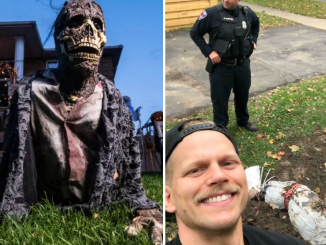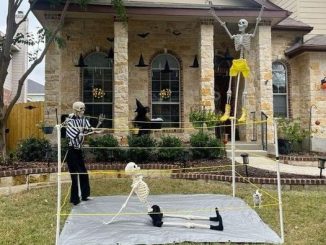
A lot of big, tragic and important things have happened to this wonderful country of ours since April 2014. None of which I have covered. I was too busy writing about hungover parenting, ancient philosophy and my dog Colin.
Out of the 536 columns I have written, 27 were about that guy. Far too few. He is such a good boy, he deserves an article a week.
Today is the end of an era for me, and whenever these final events pop up in our lives, we can’t help but think about the ultimate end.
Everything we do, we will one day do for the last time. That’s why you have to enjoy things while they are around. It’s not just big events like leaving a job, house or loved one either. Whatever moment you happen to be in now, you will never get it back, and you don’t know how many more you have.
Everything we do in life, from eating pizza to spending time with the people we love, to driving, writing, drinking or breathing, we will one day experience for the final time. It might happen tomorrow. This can be either a depressing or an inspiring thought, depending on how you look at it.
A few years back in this column, I interviewed professor of philosophy William B Irvine, of Wright State University, Ohio, on this very topic. He put it this way on a Zoom call: “Recognition of the impermanence of everything in life can invest the things we do with a significance and intensity that would otherwise be absent. The only way we can be truly alive is if we make it our business periodically to entertain thoughts of the end.”
Today’s column is very meaningful to me because it is my last. Like the last night with a lover before she goes overseas. And just like a lover, there have been some half-arsed efforts put in from me over the years. Last week, for example, I spent 750 words moaning about how bad my cricket team is. But the truth is that any of my columns could have been the final. If I had reminded myself every week for the past 10 years that the end is inevitable, I may have been more grateful for having a column and appreciated writing them all as much as I am this one.
While everything we do could have more meaning with a focus on finitude, some things are inherently more worthwhile than others. There is no doubt my column “The pros and cons of wearing Speedos” from November 2022 was less meaningful than most things in this world. That was a waste of everyone’s time. So, if we only have so much time, how do we pick the best things to do?
Well, Oliver Burkeman, the author of Four Thousand Weeks – Time Management For Mortals, suggested this to me in a 2022 column: “Ask yourself, does this choice enlarge me? You usually know on some unspoken level if it does. That’s a good way to distinguish between options.”
With that in mind, I don’t feel great about my 2018 article on “New Zealand’s best hole”. That didn’t enlarge anyone.
There will be people reading this column right now who have loved my writing in the Herald and are sad to see it end. Others will have hated it and are glad to see me go. Many won’t have any opinion at all. But for those in the first camp, I have good news. I have a book coming out on May 28 called A Life Less Punishing – 13 Ways To Love The Life You Got (Allen and Unwin Book Publishers). It’s a deep dive into the history, philosophy and science of not wasting our time lost in anger, loneliness, humiliation, stress, fear, boredom and all the other ways we find to not enjoy perfectly good lives. It’s available for pre-order right now (google it if you’re interested).
A Life Less Punishing took me two years to write and is equivalent in words to 100 of these columns. Which would be a complete nightmare for those in the hate camp, but as I say, great news for those who want more.
Anyway, thanks to the Herald for having me, thanks to the lovely people who make an effort to say nice things to me about my column nearly every day and thanks to the universe for every single second we get.
Bless!
Dad & Daughter Recreate High School Grad Photo After 18 Years – People Look Closer And Spot A Detail They Can’t Let Go

Seeing your child graduate from college or high school is one of the most special moments in your life as a parent.
Those who have experienced it will recall the sense of pride and uncontrollable happiness that arises when your not-so-little one completes a task they have been working toward for a very long time.
Dennis Roach, a Texas father, must have felt ten times better in 2018 since he was able to retake a 2000 photo of his daughter after she graduated from high school, and the outcome made people happy all around the world.
In 2000, Dennis celebrated his high school graduation with his toddler daughter Tori, which was a blessing.
They took a picture at the time, and Dennis gave his young girl a kiss. It was the fitting way to commemorate his momentous day.
It was Tori Roach who commemorated her high school graduation in 2018.
Naturally, Dennis was present to commemorate the event, and he and the other person came up with the brilliant idea of taking a fresh photo of the two of them from eighteen years ago.
In the last tale, Tori was cradled in her father’s arms and received another peck on the cheek.
Her 2000 and 2018 photos that she shared on Twitter were adored by fans. How well it will be accepted was beyond anyone’s prediction.

Under her photo, Tori added, “18 years later.” It received nearly 150,000 likes and 57,000 reposts before becoming viral.
Many others expressed their happiness with the picture in the comments section.
“This is the cutest thing ever,” someone said.
“One of the best pictures I have seen,” said an additional person. I’m wishing you and your family all the best.
“How beautiful…,” remarked a third.
However, the most intriguing aspect of the two images was undoubtedly the element that drew a lot of attention and comments from viewers.
One thing that was particularly noticeable was how little Tori’s father Dennis appeared to have aged in the two photos.

“What is the age of your father?” inquired someone.”He appears to be ageless.”
Another joker said, “I think you froze your father until you grow up.”
Did your dad age at all, dammit?A third made a joke.
Tori was shocked by the amount of interest in her post.
After graduating from high school, she was forced to clarify that her father, who was 37 at the time, wasn’t single.
She also discussed Dennis’s pride with People.
“There were a ton of notifications when I woke up. Individuals had resumed liking, commenting, and sharing. My father was really pleased with himself. Since we live in a tiny town, nothing similar to this rarely occurs. And he exclaimed, “That’s awesome!”
“I feel that not many other people get to experience that,” she continued, “so in a way, it brought me and my dad closer.”



Leave a Reply